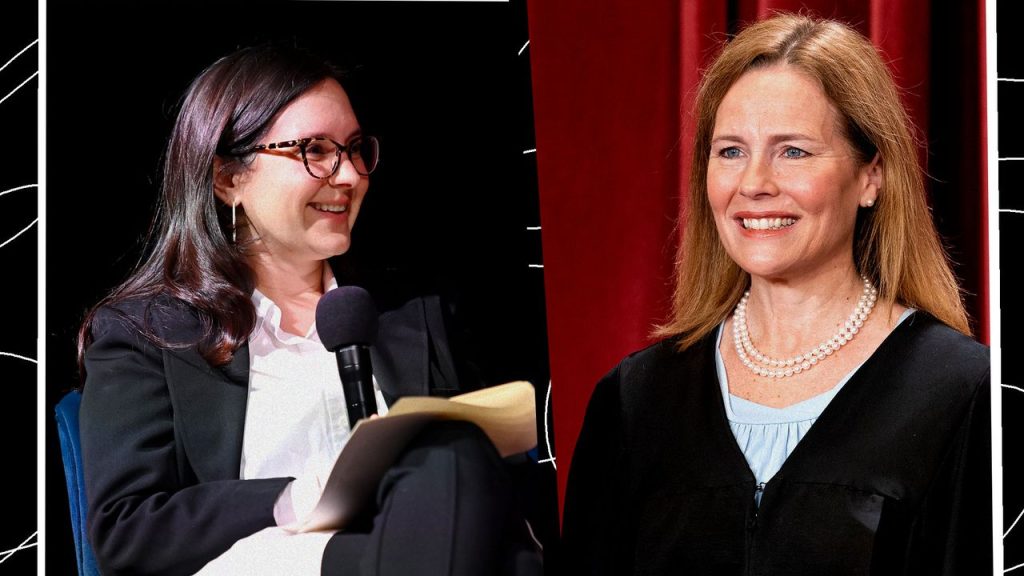“Which is it?” Weiss asked. For little more than an hour, Barrett didn’t so much answer the question as reassure her audience of New Yorkers who read The Free Press that the nation is holding up, and she and the Supreme Court are going about their job—not giving people what they want, but only applying the law to cases as they arise. And if there seems to be a conflict between the president of the United States and the judiciary, we’ve been there before.
Weiss ran through a mixture of softballs (“Tell us why you love the Constitution”) to more ripped-from-the-headlines missives about recent and relatively recent landmark rulings—such as the one granting Trump broad immunity over the January 6 attack on the Capitol and United States v. Skrmetti, which removed protections for gender-affirming healthcare for trans youth. A former legal academic at Notre Dame before becoming a judge, Barrett was as professorial as she was technical in some of her responses. When Weiss asked Barrett how will everyday people know if we’re in a constitutional crisis, Barrett didn’t flinch. “The Constitution is alive and well,” she said. “I don’t know what a constitutional crisis would look like.”
“That is not the place that we are,” she added. “It is plainly true that right now we’re at a time of passionate disagreement in America. But we have been in times of passionate disagreement before.” Barrett pointed to other times during the twentieth century when the nation has been “bitterly divided”—the Great Depression, the civil rights movement, and campus unrest during the Vietnam War—“and we have come out stronger for it.” Her prescription: to compromise, talk to one another, and to see each other as people and fellow citizens.
Whether that’s possible at a time the president is attempting to erect a national police force in more than one Democratic-led state or city, or else unleashing ICE on day laborers at Home Depots, is an open question. The Supreme Court, which at the moment is considering an emergency petition from the Trump administration to lift a judge’s ruling barring immigration agents from profiling and arresting Californian workers on account of their looks, where they congregate to seek work, or simply for speaking in Spanish, has not been a model of unity and comity during this summer’s steady stream of fast-moving decisions on its so-called shadow docket. These rulings tend to be brief, leaving lower court judges with little guidance on how to proceed and at the mercy of an administration that trains its fire on judges who don’t rule for Trump. “It is inexcusable,” one federal judge told NBC News in a report compiling frustrations from federal judges about the Supreme Court. “They don’t have our backs.”
Appearing to respond to that report, which featured interviews with 12 federal judges, Barrett struck a conciliatory tone. “Our district judges work so hard to get it right,” she said. Indeed, Barrett herself has been on the receiving end of sharp criticism from her more liberal colleagues on this point—including from Justice Jackson, who had tough words for Barrett in the watershed decision, in June, curbing federal judges’ power to issue nationwide injunctions against the federal government. (One especially sharp line aimed at Barrett: “I view the demise of the notion that a federal judge can order the Executive to adhere to the Constitution—full stop—as a sad day for America.”)
Weiss asked Barrett about her swipes back at Jackson—including this passage: “Justice Jackson decries an imperial Executive while embracing an imperial Judiciary”—and whether she regretted any of it for being, as Weiss put it, “Scalia-esque.”
“No,” Barrett said, drawing applause. She added that Jackson’s language “warranted a response.” “One thing Justice Scalia used to say that I love is, ‘I attack ideas. I don’t attack people,’” she added. “And if you can’t keep the two separate, you don’t belong on a multimember court.” (When the Supreme Court legalized gay marriage, Scalia wrote, among other memorable lines: “The Supreme Court of the United States has descended from the disciplined legal reasoning of John Marshall and Joseph Story to the mystical aphorisms of the fortune cookie.”)
In the end, the takeaway of the evening, as much for Weiss as for Barrett, who has also been a target of rightwing figures, including from Trumpland, appeared to be: Keep doing your thing, and don’t let haters get to you. “To be in this job, you have to not care,” Barrett said. “You have to have a thick skin.”

